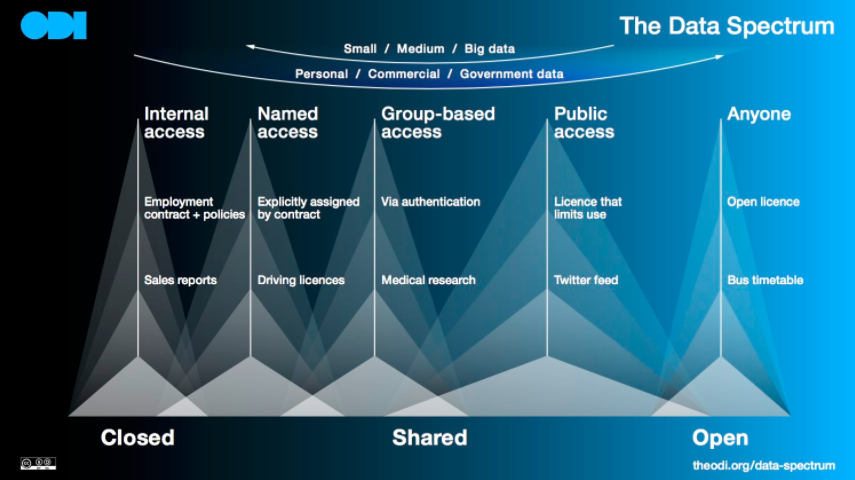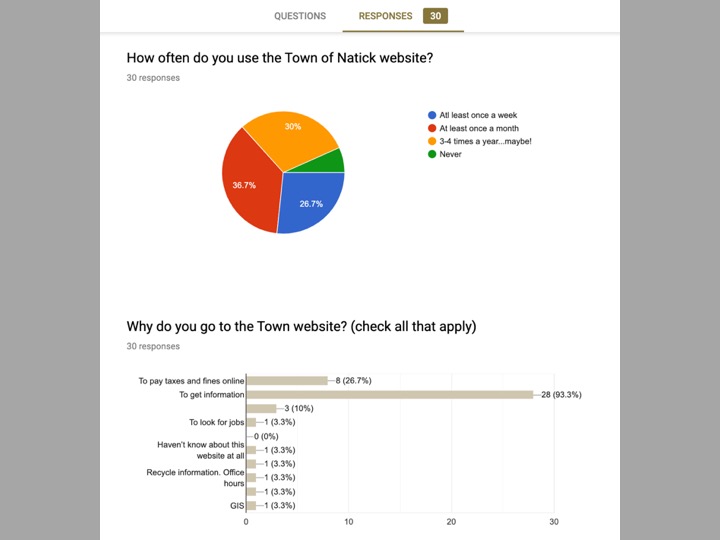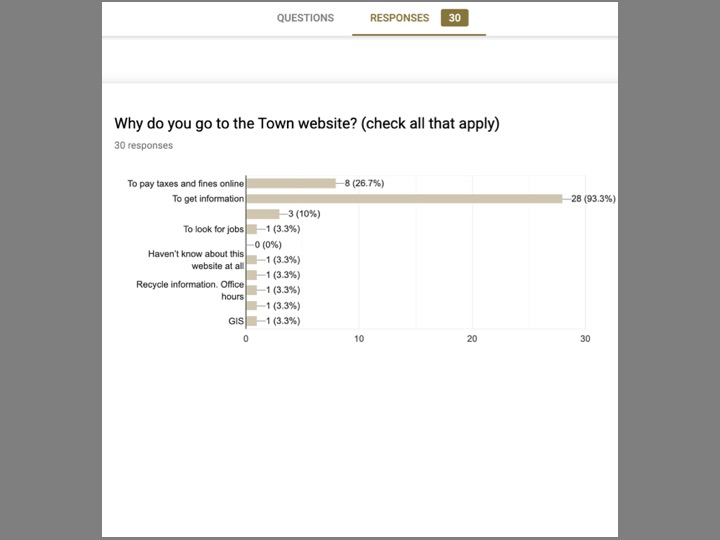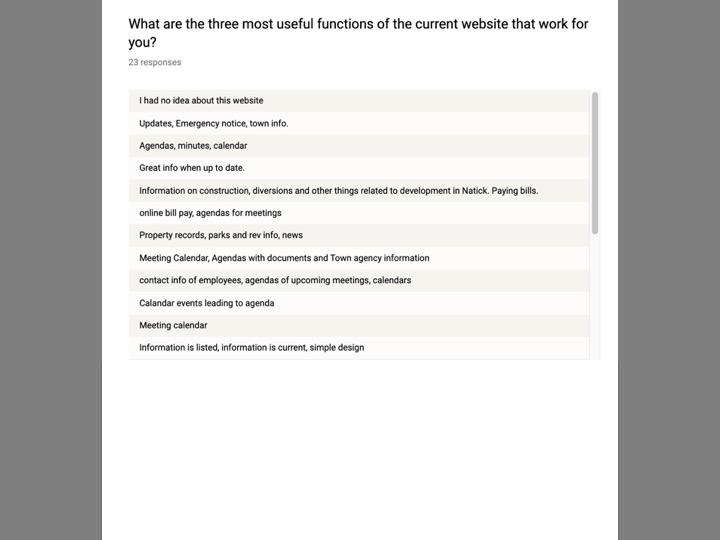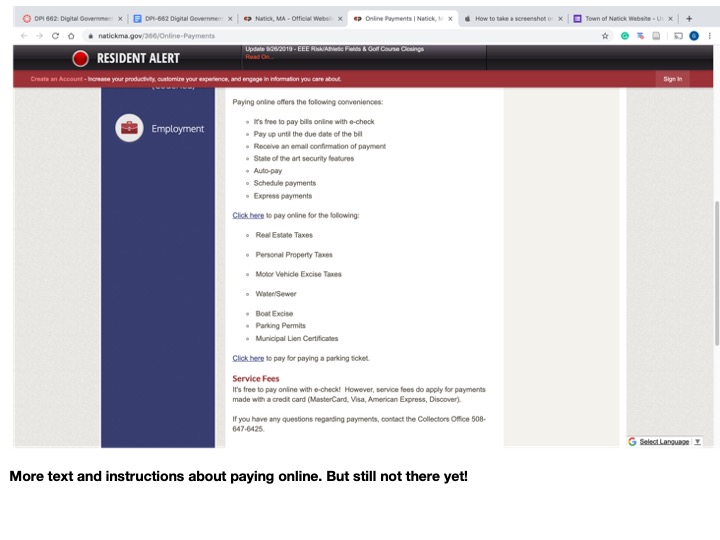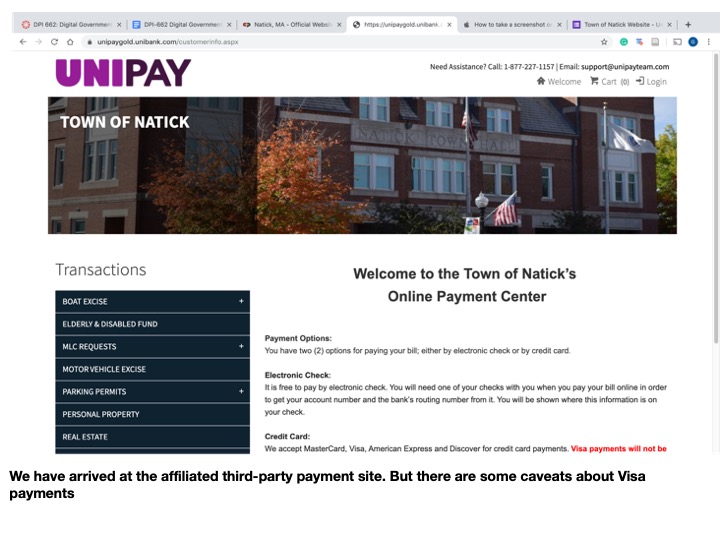About Natick, MA
Natick is located near the center of the Metrowest region in Greater Boston and has a population of 32,786 per 2010 census. The 2010-2014 American Community Survey (ACS) estimates show 66 percent of Natick residents have earned a Bachelor’s Degree or higher compared to only 40 percent state-wide. between 2010 and 2014 Natick grew 3.6%, making it one of the fastest-growing towns in the Boston area. Based on the resident demographics and education levels, Natick is well-positioned to streamline its e-Government services and consider the benefits, limits and challenges of instituting an “ask-once” policy based on a unique digital ID for the town residents.
Town Organization & Resident Services
Before we consider instituting “ask-once” policy, its critical to do a deep-dive into the existing intra-government, bureaucratic structure the evaluate the need and relevance of data currently collected by various department during the course of thousands of daily online transactions between the town government and the residents.
The town is broadly organized under the following departments and each department is responsible for a range of services. Currently, the residents can interact with the following agencies online, and each department requires the user to fill in multiple online forms depending on the nature of service request by a resident. The following list comprises a comprehensive list of Town Departments with some of key services.
Community & Economic Development
Planning Department - Permit Applications (Special Permit, Variance, Rezoning)
Building Department - Permit Applications (New Building Permit, Remodeling Permit, Gas/Electricity/Plumbing Permits, etc)
Community Services
Park & Rec (Space Bookings, Summer Camp registration - not affiliated with School District)
Senior Services (Tax Assistance, Volunteer requests, Transportation Assistance, CHORE program, Nutritional assistance, Additional services offered by Council of Aging/Natick Senior Center)
Medical Services (Insurance Counseling, BP Screening, Equipment Loan, Flu-shot clinics - services that does not trigger HIPAA paperwork)
Finance Department
Assessor (Property assessment, WebGIS, Personal exemption application)
Collector (Tax notices, Online tax payments)
Fire Department
Communications regarding Town-wide fire alarm system
Inspections
Fire watch/Detail request system
Public Health Department
Food Licenses & Permit Applications
Resident alert & mass communication systems
Library
Digital library services (book & media rentals, room bookings)
Event announcements
Police Department
Online reporting
Sex offender registry
Emergency announcements
Public Works
Trash & Recycling (special announcements, holiday schedules)
Water & Sewer (online payments, permit applications)
Emergency & Public Health alerts
Natick Public School
Scores of online forms! (school registration, after school program registration, school bus, cafeteria account, emergency contacts, complaints, school/class-specific announcements, etc)
Benefits of Single Resident-ID & Ask-Once Policy
Such a policy would minimize the paperwork, increase cooperation between various agencies that currently occupy a three-story town hall, but seldom seem to get the records straight.
Per Natick 2030 Master Plan, about 28% of Natick’s residents are over 55 years of age and this number is expected to increase. An aging population that is dependent on Town Services, but less nimble in keeping up with the rapid pace of technological changes will stand to benefit more from an “ask-once” policy.
In addition to streamlining service requests from residents, specific departments within the town governments will stand to benefit from greater transparency. For example, currently the Assessors department is in charge of maintaining the WebGIS information, but the information will stand to benefit more with Zoning Overlay information that is maintained by the Planning & Community Development Department.
Minimizing authentication and consolidation of data will also help marginalized communities and households within the Town with limited internet access and technological proficiency to avail Town services.
Town of Natick - Potential Data Sharing Stack
“Ask Twice”? Decoupling Public School Data from other Datasets
I would recommend decoupling the digital systems for Natick Public School (NPS) from the rest of the town’s Departments. NPS data involves significant information about the minors and keeping it separate would be in the best interest of the children, parents, teachers and school administration. Furthermore, confidential data on minors in the hands of malicious actors is a serious threat that could be minimized by keeping the Public School data as a discrete highly secure data set. That said, the digital systems should be able to communicate with each other to retrieve and analyze publicly available data such as household sizes, level of education and school performance statistics.
Security Threat Assessments
Town has no need and should not be in the business of collecting biometric data or social security numbers from the residents. Not possessing personal financial data and biometric information should minimize the threat levels from external hackers. Any payments made by the residents for Town Services should be routed through an encrypted third party payment system that employs two factor authentication pre-established at the start of the ask-once process. Security threats are likely to come from private actors seeking quick paydirt. Perhaps having a direct communication channel with the resident over email and text messaging can equip the Town to send out periodic alerts to residents to warn them against potential phishing threats.
Additional Reference: http://securitycards.cs.washington.edu/cards.html
Other Considerations
The town should design for a “digital ecosystem and not a digital system” . Even within the Town departments, some data is best kept separate. For instance, there is no reason, the Police department should be able to peek at the books checked out by a resident without a warrant.
Ask only for the data that is required for the Town Department to be able to provide their mandated service. Do not ask for data that is “nice to have, but not required to provide services”
While designing specific data protections, visualize data as a “part of a spectrum”. Some data that is already in the public domain as required by law (ownership information, property information, assessment) should continue to remain easily accessible.
Employ “Digital Proofs” on an as-needed basis for cryptographically signed government documents.
Source: Open Data Institute
References
Government as a platform playbook: https://platformland.github.io/playbook/book/text/trust.html
Security Threat Assessment | http://securitycards.cs.washington.edu/cards.html


